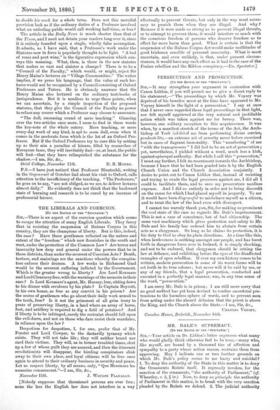MR. DALE'S SUPREMACY.
[TO THE EDITOR OF THE"SPECTATOR."] SIR,—Your article on Dr. Liddon's letter expresses what many who would gladly think otherwise feel to be true,—many who, like myself, are bound by a thousand ties of affection and sympathy to a party whose action reason restrains them from approving. May I indicate one or two further grounds on which Mr. Dale's policy seems to me hasty and suicidal? 1. To deny the authority of the State in this matter is to deny the Ornaments Rubric itself. It expressly invokes, for the sanction of the ornaments, "the authority of Parliament," (cf. Wheatley, c. 2, § iv.) Now, to deny on principle the authority of Parliament in this matter, is to break with the very sanction pleaded by the Rubric we defend. 2. The judicial authority of the Privy Council cannot be denied, without denying that supremacy of the Crown, " in all causes ecclesiastical, as well as temporal," which the Church committed herself to at the Re- formation, and has never ceased to own (see especially Hooker, viii., viii., 5, 6), and in virtue of which "the King, as the only supreme governor on earth, by his delegates may give a final, definitive sentence, from which no further appeal may be made." (Hooker, ibid.) 3. The same is true of the legislative function. There is no law ecclesiastical, which binds at the present day, which does not do so by State authority. Parliament in passing CI bloc the Revised Prayer-book of 1662 expressly reserved to themselves the right, had they so chosen, to control it in detail. The new bishoprics of Truro, Liverpool, &c., are pieces of State legislation, accepted by the Church without a murmur. 4. If it be a duty to resist State legislation and judgments in Church matters now, it must always have been so. Surely, then, had Mr. Dale and Mr. Wood lived three hundred years ago, they would have been with Fisher and More rather than with Cranmer and Ridley, with Edmund Campion rather than with Matthew Parker. The principles on which they act, if true, condemn their own Church, and their own claim to represent that Church. I write this letter with some pain, but if you kindly give it a place in your columns, possibly some answer, at present unknown to me, may be made, and established.—I







































 Previous page
Previous page